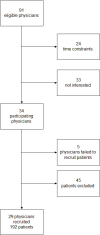Arriba-lib: evaluation of an electronic library of decision aids in primary care physicians
- PMID: 22672414
- PMCID: PMC3461416
- DOI: 10.1186/1472-6947-12-48
Arriba-lib: evaluation of an electronic library of decision aids in primary care physicians
Abstract
Background: The successful implementation of decision aids in clinical practice initially depends on how clinicians perceive them. Relatively little is known about the acceptance of decision aids by physicians and factors influencing the implementation of decision aids from their point of view. Our electronic library of decision aids (arriba-lib) is to be used within the encounter and has a modular structure containing evidence-based decision aids for the following topics: cardiovascular prevention, atrial fibrillation, coronary heart disease, oral antidiabetics, conventional and intensified insulin therapy, and unipolar depression. The aim of our study was to evaluate the acceptance of arriba-lib in primary care physicians.
Methods: We conducted an evaluation study in which 29 primary care physicians included 192 patients. The physician questionnaire contained information on which module was used, how extensive steps of the shared decision making process were discussed, who made the decision, and a subjective appraisal of consultation length. We used generalised estimation equations to measure associations within patient variables and traditional crosstab analyses.
Results: Only a minority of consultations (8.9%) was considered to be unacceptably extended. In 90.6% of consultations, physicians said that a decision could be made. A shared decision was perceived by physicians in 57.1% of consultations. Physicians said that a decision was more likely to be made when therapeutic options were discussed "detailed". Prior experience with decision aids was not a critical variable for implementation within our sample of primary care physicians.
Conclusions: Our study showed that it might be feasible to apply our electronic library of decision aids (arriba-lib) in the primary care context. Evidence-based decision aids offer support for physicians in the management of medical information. Future studies should monitor the long-term adoption of arriba-lib in primary care physicians.
Figures
Similar articles
-
Development and validation of a generic questionnaire for the implementation of complex medical interventions.Ger Med Sci. 2014 Apr 1;12:Doc08. doi: 10.3205/000193. eCollection 2014. Ger Med Sci. 2014. PMID: 24696674 Free PMC article.
-
Acceptance of shared decision making with reference to an electronic library of decision aids (arriba-lib) and its association to decision making in patients: an evaluation study.Implement Sci. 2011 Jul 7;6:70. doi: 10.1186/1748-5908-6-70. Implement Sci. 2011. PMID: 21736724 Free PMC article.
-
Arriba-lib: association of an evidence-based electronic library of decision aids with communication and decision-making in patients and primary care physicians.Int J Evid Based Healthc. 2012 Mar;10(1):68-76. doi: 10.1111/j.1744-1609.2012.00255.x. Int J Evid Based Healthc. 2012. PMID: 22405418
-
arriba-lib: Analyses of user interactions with an electronic library of decision aids on the basis of log data.Inform Health Soc Care. 2012 Dec;37(4):264-76. doi: 10.3109/17538157.2012.654841. Epub 2012 Jun 12. Inform Health Soc Care. 2012. PMID: 22690786
-
Impact of decision aids used during clinical encounters on clinician outcomes and consultation length: a systematic review.BMJ Qual Saf. 2019 Jun;28(6):499-510. doi: 10.1136/bmjqs-2018-008022. Epub 2018 Oct 9. BMJ Qual Saf. 2019. PMID: 30301874 Free PMC article.
Cited by
-
Assessing physicians' agreement and the completeness of the decision aid 'arriba Diabetes': a cross-sectional study.BMC Prim Care. 2025 Jul 8;26(1):218. doi: 10.1186/s12875-025-02887-x. BMC Prim Care. 2025. PMID: 40629320 Free PMC article.
-
The Optimizing-Risk-Communication (OptRisk) randomized trial - impact of decision-aid-based consultation on adherence and perception of cardiovascular risk.Patient Prefer Adherence. 2019 Mar 27;13:441-452. doi: 10.2147/PPA.S197545. eCollection 2019. Patient Prefer Adherence. 2019. PMID: 30988601 Free PMC article.
-
Development and validation of a generic questionnaire for the implementation of complex medical interventions.Ger Med Sci. 2014 Apr 1;12:Doc08. doi: 10.3205/000193. eCollection 2014. Ger Med Sci. 2014. PMID: 24696674 Free PMC article.
-
An informed shared decision making programme on the prevention of myocardial infarction for patients with type 2 diabetes in primary care: protocol of a cluster randomised, controlled trial.BMC Fam Pract. 2015 Mar 31;16:43. doi: 10.1186/s12875-015-0257-2. BMC Fam Pract. 2015. PMID: 25887378 Free PMC article. Clinical Trial.
-
Reduction of the long-term use of proton pump inhibitors by a patient-oriented electronic decision support tool (arriba-PPI): study protocol for a randomized controlled trial.Trials. 2019 Nov 21;20(1):636. doi: 10.1186/s13063-019-3728-2. Trials. 2019. PMID: 31752978 Free PMC article.
References
-
- O'Donnell S, Cranney A, Jacobsen MJ, Graham ID, O'Connor AM, Tugwell P. Understanding and overcoming the barriers of implementing patient decision aids in clinical practice. J Eval Clin Pract. 2006;12(2):174–181. - PubMed
-
- Thistlethwaite J, Evans R, Tie RN, Heal C. Shared decision making and decision aids - a literature review. Aust Fam Physician. 2006;35(7):537–540. - PubMed
-
- Holm S, Davies M. In: Shared decision-making in health care. Edwards A, Elwyn G, editor. Oxford University Press, Oxford; 2009. Ethical issues around evidence-based patient choice and shared decision-making.
-
- Barratt A. Evidence Based Medicine and Shared Decision Making: the challenge of getting both evidence and preferences into health care. Patient Educ Couns. 2008;73(3):407–412. - PubMed
Publication types
MeSH terms
LinkOut - more resources
Full Text Sources





